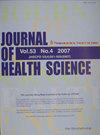Genetic Polymorphism In Individuals With Type II Diabetes Mellitus Using PCR-RAPD In Sidoarjo District
引用次数: 2
Abstract
Received: December, 25, 2020 Revised: May, 4, 2021 Available online: May 2021 Diabetes Mellitus type II (T2DM) is a metabolic disorder. Its incidence increases from year to year. The control of T2DM incidence is problematic because it is involved genetic and environmental factors. Moreover, it can cause complications in people with infectious diseases. This study aims to determine the polymorphism of sufferers and non-sufferers of T2DM using the Polymerase Chain Reaction-Random Amplified Polymorphic DNA (PCR-RAPD) method. This research was descriptive-analytic with a cross-sectional approach. The sample consisted of 60 samples – 30 positive and 30 negative samples taken from several clinics in the Sidoarjo district. The primer used was A18 (5'AGGTGACCGT-3'). Data analysis used Chi-square with a 95% confidence level. The results produced 17 bands with the length of 197 bp, 239 bp, 269 bp, 319 bp, 390 bp, 530 bp, 588 bp, 686 bp, 777 bp, 972 bp, 1175 bp, 1676 bp, 2780 bp, 3843 bp, 6563 bp, 11072 bp & 18434 bp. The four bands were monomorphic. Two bands that showed significantly different results were 319bp (p=0.035) and 18434 bp (p=0.004). In conclusion, there are significant differences between people with and without T2DM in several fragments, namely 319 bp and 18434 bp bands. Further analysis needs to confirm the genes involved.利用PCR-RAPD分析Sidoarjo地区2型糖尿病患者的遗传多态性
收稿日期:2020年12月25日修稿日期:2021年5月4日在线发布日期:2021年5月2日糖尿病(T2DM)是一种代谢性疾病。其发病率逐年上升。2型糖尿病发病率的控制是有问题的,因为它涉及遗传和环境因素。此外,它还会给患有传染病的人带来并发症。本研究旨在利用聚合酶链反应-随机扩增多态性DNA (PCR-RAPD)方法确定T2DM患者和非T2DM患者的多态性。本研究采用横断面方法进行描述性分析。该样本由60个样本组成,其中30个阳性样本和30个阴性样本取自Sidoarjo区的几个诊所。引物为A18 (5'AGGTGACCGT-3')。数据分析采用卡方分析,置信水平为95%。结果共得到17条条带,长度分别为197 bp、239 bp、269 bp、319 bp、390 bp、530 bp、588 bp、686 bp、777 bp、972 bp、1175 bp、1676 bp、2780 bp、3843 bp、6563 bp、11072 bp和18434 bp。这四个条带是单态的。319bp (p=0.035)和18434 bp (p=0.004)两个波段的结果差异有统计学意义。综上所述,T2DM患者和非T2DM患者在319 bp和18434 bp的几个片段上存在显著差异。进一步的分析需要确认相关基因。
本文章由计算机程序翻译,如有差异,请以英文原文为准。
求助全文
约1分钟内获得全文
求助全文

 求助内容:
求助内容: 应助结果提醒方式:
应助结果提醒方式:


